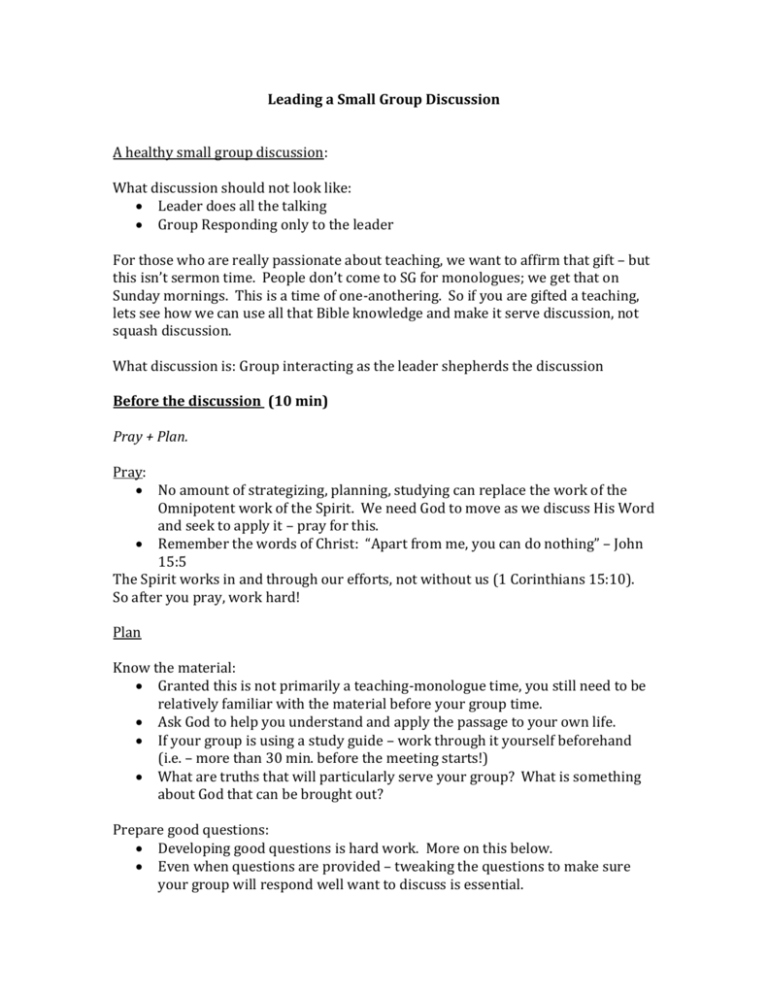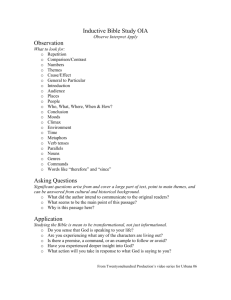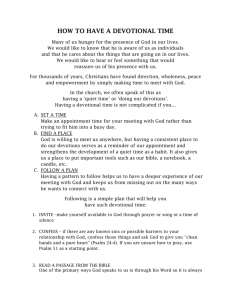Leading a Small Group Discussion (handout)
advertisement

Leading a Small Group Discussion A healthy small group discussion: What discussion should not look like: Leader does all the talking Group Responding only to the leader For those who are really passionate about teaching, we want to affirm that gift – but this isn’t sermon time. People don’t come to SG for monologues; we get that on Sunday mornings. This is a time of one-anothering. So if you are gifted a teaching, lets see how we can use all that Bible knowledge and make it serve discussion, not squash discussion. What discussion is: Group interacting as the leader shepherds the discussion Before the discussion (10 min) Pray + Plan. Pray: No amount of strategizing, planning, studying can replace the work of the Omnipotent work of the Spirit. We need God to move as we discuss His Word and seek to apply it – pray for this. Remember the words of Christ: “Apart from me, you can do nothing” – John 15:5 The Spirit works in and through our efforts, not without us (1 Corinthians 15:10). So after you pray, work hard! Plan Know the material: Granted this is not primarily a teaching-monologue time, you still need to be relatively familiar with the material before your group time. Ask God to help you understand and apply the passage to your own life. If your group is using a study guide – work through it yourself beforehand (i.e. – more than 30 min. before the meeting starts!) What are truths that will particularly serve your group? What is something about God that can be brought out? Prepare good questions: Developing good questions is hard work. More on this below. Even when questions are provided – tweaking the questions to make sure your group will respond well want to discuss is essential. Good questions lead people to interact with the material and apply it to their lives. If studying a specific passage (Bible Study), three basic questions could be of great service: o O.I.A Observation – What does the text say? Interpretation – What does it mean? Application – How can we apply this? WHAT I DIDN’T SAY WAS: “Plan 20 min before Study begins” – just to be clear. In all your praying and planning… Remember your goal: The fruitful application of God’s Word You must remain committed to this purpose. If we forget this, discussions turn into debates, story-telling times, or “can you top this?” There are a number of great discussions to be had on different subjects: politics, technology, organic farming – but having a great discussion is not the goal – we want a great discussion that leads to fruitful application of God’s Word in our lives! Even when you are discussing material from a book, article, sermon, studyguide, etc. – highlight the biblical truth in the material. 2 Timothy 3:16 states that is ALL Scripture is breathed out by God and profitable for teaching, for reproof, for correction, and for training in righteousness, that the man of God may be complete, equipped for every good work. James 1:22 Information alone is not sufficient, we need transformation. 2 Corinthians 4. Beholding God in his glory, leads to transformation from one degree to another. There is a world of difference between knowing God and knowing about God. During the discussion Setting Arrange the group in a circle-ish environment so everyone can see each other. Make room for people on the outskirts. If everyone is facing you, you’re the center – make the group feels like a group! Try to keep it free of distractions: pets, TV, cell phones, bad smells (shower), etc. Begin on time If people understand that SG begins on schedule, they will work harder to get to the meeting on time. But if you get into the habit of waiting for those who are late, they will assume that the discussion begins whenever they arrive. If people do occasionally show up late – show grace, instead of using guilt to manipulate. When people are trickling in at odd times, it can often kill a discussion that is beginning to take hold. If someone has to be regularly late (work/etc.) – coach him or her privately about how to join when late without interrupting the flow of discussion. Excomes in 30 min. late and glad-hands and high-fives every person on arrival – not cool. Discussion time: Discussion time is a conversation not a Q&A. You’re not the answer-guy (girl) o Let the group know that you don’t have all the answers. If a question is asked, and you don’t know the answer – tell the person, “I don’t know.” o Toss the question to the group. o Offer to do some digging or prompt another person who may be interested to do some research. o Address it next time you meet Build trust – Discussion happens in the context of relationships. It is not merely about the discussion, but about the people there. Build these relationships! Informal time creates trust. Sharing our stories creates trust, etc. Don’t rely on the discussion alone to time to create relationships. Cultivate this outside of grouptime. You are there for the people, not the Study Guide. o If someone says something, that is slightly off-topic, but the tip of the iceberg for deeper heart issues – feel free to follow the Spirit’s leading to pursue that in conversation. Don’t be a slave to the Guide. Make sure everyone feels free to participate, and it is okay to interrupt if they have a question/concern, etc. Throw it back: o Direct responses or questions back to the group when they are directed to you. “What does the rest of the group think about that? Anyone want to respond?” Open-ended questions: o Not “yes-or-no” questions, like- “Did you guys enjoy the passage this week?” o Instead ask, “What did you like about the passage? What are some things that really encouraged you?” Ask follow-up questions o Dig deeper into answers to make the discussion come alive! “Would that work in another situation?” “Can you think of any passages that speak specifically to that?” “What you mentioned…how does that work in everyday life?” Acknowledge everyone that participates o A nod, eye contact, or even verbal encouragement! Refer back to a point that someone else has made o This is critical and makes a big difference: “That’s like what Spence said a little while ago about God being kind…”) When someone has just said something, use summary statements to clarify the discussion: “So, what I hear you saying is…” etc.) Ask questions in a conversational tone. Don’t sound like you are reading out of a book or say, “What about question 4?” o Rephrase the question. Ask the same thing in your own way. Allow some tangents, but refocus when necessary o If the group wanders from the passage or material, but it is really hitting at heart issues – be open to the Spirit o If the tangent is trivial and a rabbit-trail – refocus the group to a fruitful discussion by saying something like, “Okay, well – let’s see if we can get back to our original question, what do you think…” Guarding the discussion As a leader, you are to shepherd and guard the discussion from moving towards unedifying situations: Avoid having people confess other people’s faults/sins o About a spouse, or co-worker, etc. Encourage confession of their sins, but not others Avoid divisive and unloving doctrinal discussion o Healthy discussions and disagreements about doctrine can be greatly edifying – however, without charity – they do little benefit to others. Avoid entertaining negative attitudes towards the Church o The Church is Christ’s bride. He saw her stains and decided to cleanse them his blood. If people see where the Church can reform (and they should) – encourage them to serve her by plugging in, instead of criticizing her. o Concerns about church issues should be talked about at SG in a healthy and positive way. In a way that encourages ownership and avoids the us-vs. -them mindset. “How can we change as a people.”? o Encourage anyone with specific concerns to bring it to the church leadership o Use of “you guys” vs. “we” language Avoid one person’s continual problem to become the focus of group-time o When someone goes through a difficult time in their life (and we all will), the small group should rightly rally around them. There are many things we can do to care for and minister to each other during our SG time together. o Use sound judgment to discern when is it time to focus off ourselves and onto the task at hand. Perhaps the most loving thing to do is show the person the great Omnipotent God of the Bible in the midst of their struggles. Discussion killers – be aware of them. Better yet – don’t be one of them: Discussion dominator Emotional breakdown Dead silence Story-teller Respond with grace and humility Assume the best about the person Remember that everyone has a story to tell Pressing into Application - remember this The hardest and most important task in discussions is pressing the point home to application. The leader who fails to do this, is leading a group down a path of deception: James 1:22 – But be doers of the words, not hearers only, deceiving yourselves. Resting in the gospel amidst good and poor discussion nights Don’t forget the gospel. Leading by weakness and relying on grace. Do you feel self-assured after a good night of discussion? Terrible after a bad night? Where is your ultimate hope? Colossians 1.








